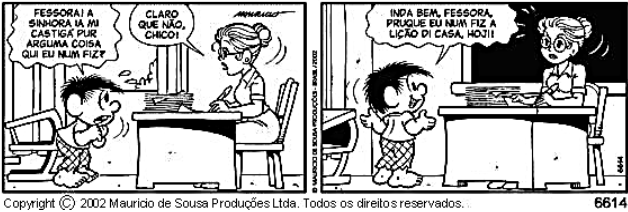Questões de Concurso
Para prefeitura de arapiraca - al
Foram encontradas 392 questões
Resolva questões gratuitamente!
Junte-se a mais de 4 milhões de concurseiros!
Choose the correct alternative:
1. For English speakers, Spanish is easier than Russian.
2. In the U.S. the average height for 17-year-old girls is 166,5 cm; for boys it’s 179,7 cm. At that age, girls are usually shorter than boys.
3. Mars is farther from the sun than the earth is, so its temperature is much lower. Mars is hotter than the earth.
4. Diamonds are beautiful, but they are also very hard. In fact, they are the hardest things found in nature.
5. John F. Kennedy was only 43 years old when he was elected president. He was the younger man ever elected president of the U.S.
True or False?
Choose the best alternative:
The teacher asked them how long they had been studying English.
Romeo and Juliet by Shakespeare.
1. If Romeo had met the messenger, he killed himself.
2. If Juliet hadn’t killed herself, Romeo wouldn’t have killed himself either.
3. If Romeo’s and Juliet’s families hadn’t been enemies, they would have gotten married.
4. If Romeo had met the messenger, he wouldn’t have killed himself.
5. If Shakespeare hadn’t been born, he would never have written Romeo and Juliet.
True or False?
Use the right words to complete the sentences, but, when, where, and, then:
1. This is the house…………….. I live in.
2. Learning a foreign language is important ……………..it can help you find a good job.
3. I usually go to the beach …………………. I'm very stressed.
4. The weather is wonderful, ………………… we can go to the beach.
5. I like wine …………………I don't like beer.
Choose the correct alternative:
Choose the correct alternative to complete the sentences:
“I don’t think that red blouse really goes…………..your orange skirt, dear.”
“What a fascinating story. Do go ……….!”
“There’s an awful influenza virus going……………. . I hope you don’t catch it.”
“Did you know that a camel can go…………….water for thirty days?”
“One by one, the street lights went……………., leaving us in total darkness.”
True or False?
1. brought about (2nd paragraph) means fez surgir. 2. turns me on (4th paragraph) means me interessa. 3. issue (4th paragraph) means item. 4. The author's excellent approach (4th paragraph) means o autor tem uma ótima aprovação. 5. a classic work by itself (4th paragraph) means um clássico por si só.
Choose the correct alternative:
The author:
Choose the best alternative:
My mother asked me if I had already had dinner.
Text: WHO’S KILLING BRAZIL’S STREET CHILDREN?
Kids under 18 in Brazil…..........in numbers not found anywhere in the world apart from countries openly at war. Last year’s estimated 1.000 child killing actually represented an improvement: the average annual figure for the previous three years was more than 1.500. Brazilian’s horror has inspired the biggest surge of social activism since the 1970’s. But the killings continue. Wellington Barbosa never had a chance. The 14-year-old street kid was walking down a busy Rio de Janeiro avenue with his half-sister and her boyfriend one recent afternoon when a man with a green shirt shot to kill him.
Choose the correct answer:
- Widdowson, H.G., 1978.
The distinction expressed by the author implies that
Observe os quadrinhos da tirinha abaixo para responder a questão.

I- Vou pedir para Alice _________ minha música preferida na festa. Espero que ela possa ________ ao meu pedido, assim que eu _________. Gosto demais quando ela _______ presente.
Observe os quadrinhos da tirinha abaixo para responder a questão.

I- A norma foi estabelecida por todos os presentes. II- A norma foi estabelecida por conveniência geral.